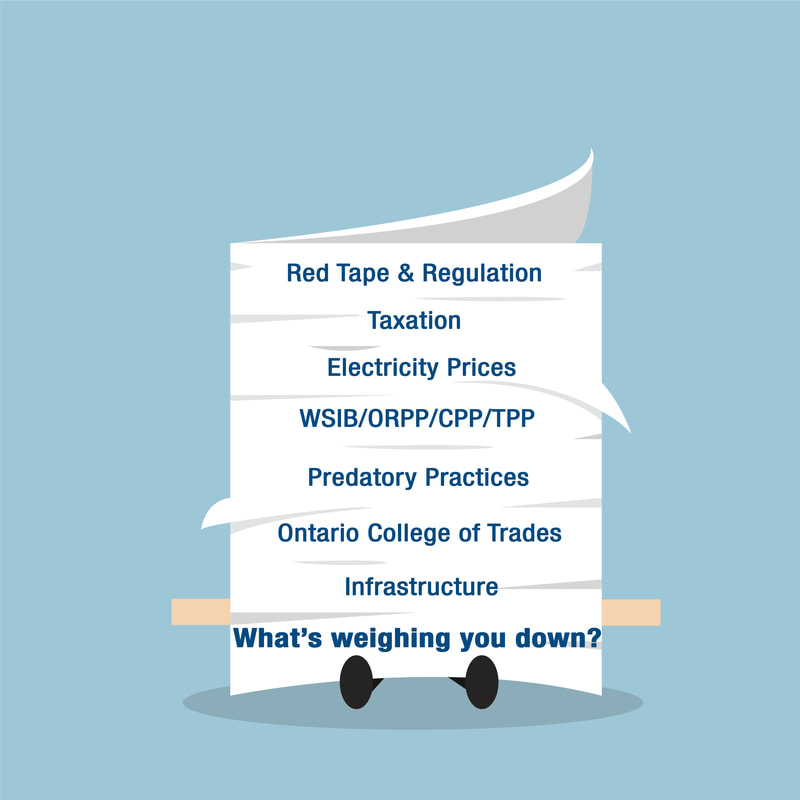 The 5 Minutes for Business article (below), printed in its entirety, is about the biggest challenge facing business at all levels of government -cumulative burden, or the true overarching cost of being in business. The focus of the article by Hendrik Brakel of the Canadian Chamber of Commerce (CCC) is in the CCC's dealings with the federal government, but there are other pieces of legislation in the provincial and municipal realms that play significant roles in the cumulative burden on business. Business owners do not have the luxury of isolating the various input costs and regulations they face each day. Cumulative expenses such as high electricity prices, sector-specific costs for materials, compliance, wages, the upcoming changes to WSIB models, workplace requirements, and CPP enhancements have the potential to be overwhelming and ultimately impact competitiveness. 5 Minutes for Business: Every so often, one of our government contacts will ask a question that goes like this, “Why is the Canadian Chamber complaining about (pick one): the new carbon tax/the CPP premium increase/the deferral of small business tax reductions/the proposal to tax passive income/this new regulation/that increase in fees? It’s not a huge cost to business. Why are you making a big deal?” We politely explain that all of these tax increases come out of the same pocket. If you take one of these tax hikes individually, it may be small, but when you add them all up, we’re accumulating a rather large pile of straws on the camel’s back. And that’s the problem. Canada is an expensive place to do business. Last week, the President and CEO of the Canadian Chamber of Commerce and his provincial and territorial colleagues wrote to the Prime Minister to point this out. The letter was also sent to all of the provincial premiers because, right across the country, we are worried that “the cost of doing business in Canada is rising. This concern is not limited to the costs generated by the fight against climate change, but reflects the serious cumulative impact of the growing burden posed by fees, taxes and regulations the private sector is being asked to bear. Our members are deeply worried about their ability to both grow their businesses within Canada or compete for investment and customers from abroad. This concern becomes even more substantial when we see the determination of the U.S. administration to dramatically cut both regulation and business taxes in that country.” As luck would have it, our letter was published on the same day that Petronas cancelled a $36-billion LNG investment in British Columbia. It’s impossible to pin the blame for the decision on any one factor (Petronas vaguely cited “market conditions”), but the uncertainty around project approval, along with regulatory, tax and cost burdens all contributed. The effect is a loss of jobs for Canadian families, truly a missed opportunity for Canada. It’s not just Petronas, Canada has seen a mass exodus of investment, a staggering $60 billion has left over the past two years (in 2017, Shell divested $7.5B, Marathon sold $2.5B and ConocoPhillips $17.7B. Most has gone to other jurisdictions). And we’ve seen some of the players shedding Canadian energy assets while investing more in the U.S. It’s true that U.S. shale enjoys a modest cost advantage over oilsands production, but we worry that Canada’s high costs and dithering over pipelines is having a big impact. As the Globe and Mail pointed out last week, “It’s beginning to feel it is becoming impossible for any new interprovincial pipelines to ever get built […] because of obstructionist games played by premiers and mayors. […] Environmental benefit: Nil. Economic cost: High.” And it’s not just oil and gas. Last week, we sat down with a major multinational agri-food producer who told us that, for his company, regulations are a bigger cost than taxes. The company was struggling with Canada’s new food labelling rules and asked if the current government is “sensitive” to the cost burden of regulation. I said the word “sensitive” is too strong. “Blissfully unaware” might be a better descriptor. The government wants to attract more foreign investment, but in a tough globalized environment. What really attracts investors is the rate of return. That’s why costs, rules and regulations are so important. And they have real world impacts on Canadian families and their prosperity. Last week, we wrote to the Prime Minister, “As we increase business costs to address climate change, we urgently need to find ways to lower costs elsewhere. […] to strengthen Canada’s economic competitiveness.” Global capital can go anywhere. The wolf is at the door. Find this 5 Minutes for Business article and others at chamber.ca Comments are closed.
|
AuthorThe Peterborough and the Kawarthas Chamber of Commerce acts as a catalyst to enhance business growth, opportunity, innovation, partnerships and a diverse business community. Archives
June 2024
Categories |
|
Copyright Greater Peterborough Chamber of Commerce. All rights reserved.
175 George Street North, Peterborough, ON, K9J 3G6 Phone: (705) 748-9771 | (705) 743-2331 Home | Calendar | Site Map | Privacy | Accessibility |
